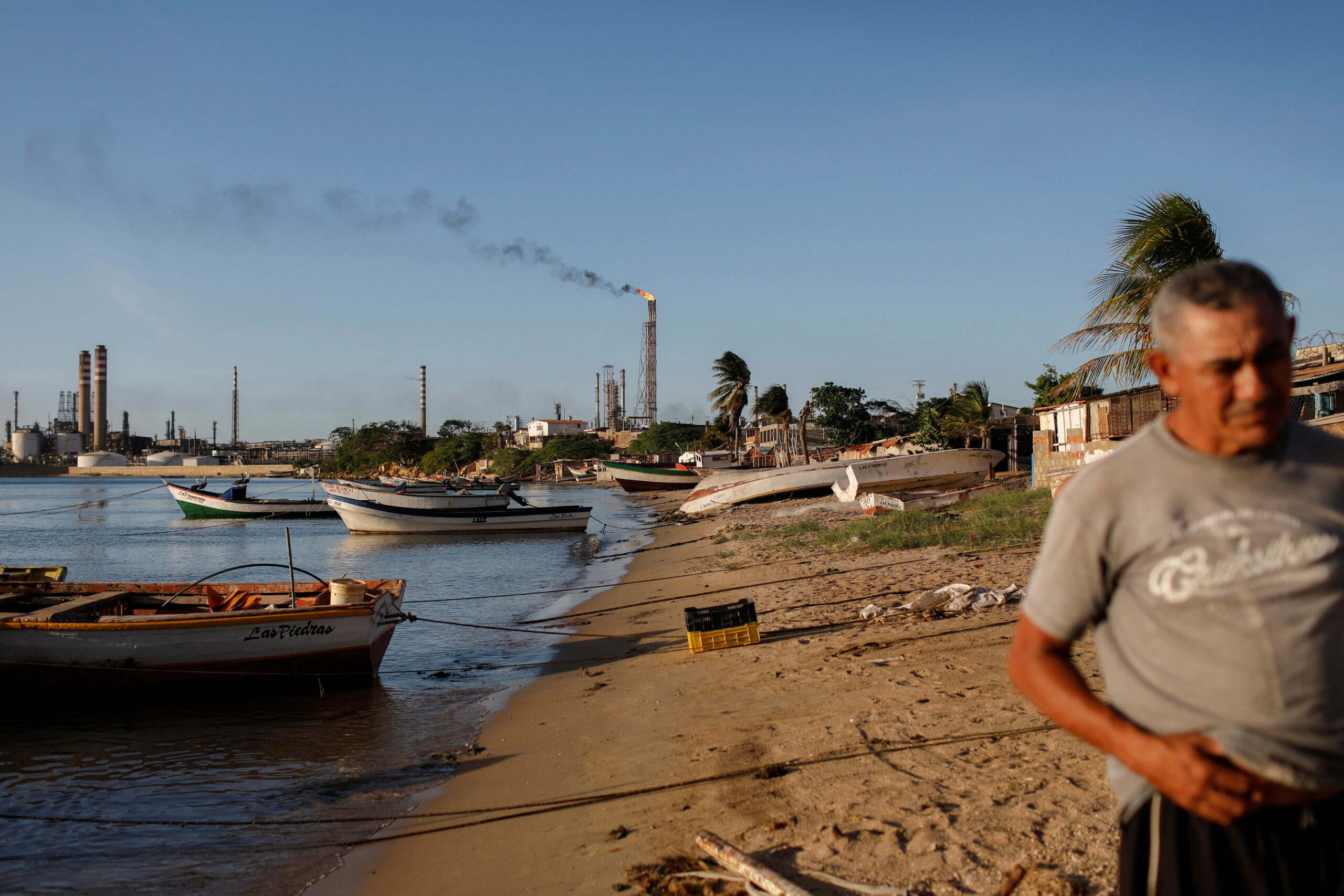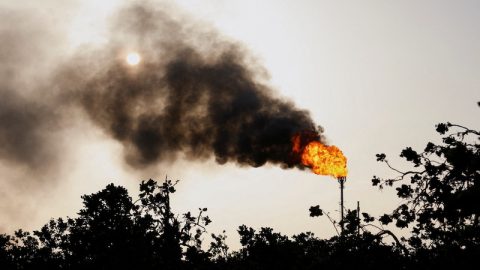Welcome to Carbon Brief’s DeBriefed.
An essential guide to the week’s key developments relating to climate change.
This week
Asian extreme weather
SWELTERING: An intense heatwave is sweeping across south and eastern Asia. The Dhaka Tribune said temperatures in Bangladesh have surpassed 40C in many regions and the Daily Star reported that the country recorded at least 23 days “heatwave days” in April. Agence France-Presse reported that Thailand’s capital, Bangkok, reached 40.1C on Wednesday. The Bangkok Post added that temperatures could reach 43C in northern Thailand next week. (See Carbon Brief’s recent on-the-ground reporting on the impacts of climate change on human migration in Thailand.) Schools across the Philippines, Bangladesh and India have been forced to close due to the heat, according to BBC News.
ELECTION HEAT: In India, the heatwave coincides with the country’s six-week general election, in which nearly one billion people are eligible to vote, the New York Times reported. India’s election authorities have set up a taskforce “to review the impact of heatwave[s]” on the election after a significant decrease in voter turnout, the Indian Express said. India’s Economic Times added that temperatures in the country will peak on 27-28 April.
FLOODING: More than 110,000 people have been evacuated from China’s Guangdong province after record-breaking rainfall caused widespread flooding, state news agency Xinhua reported. China Daily said that southern China has experienced more than double the typical rainfall for April. The flooding has caused economic losses exceeding 140m yuan ($19.8m), according to the People’s Daily Online. Meanwhile, the Financial Times reported that the World Meteorological Organization has published a report warning that climate change “is causing major repercussions across Asia”.
Legal action
HISTORIC ENQUIRY: The Inter-American Court on Human Rights in Barbados is hearing the first part of a “historic” inquiry this week, the Guardian said. The New Humanitarian reported that Colombia and Chile are “asking the hearing to define states’ legal responsibility to combat climate change and prevent it from violating people’s human rights”. It added that the court will hear from Julian Medina, a Colombian fisherman, among others.
HEALTH FAILURE: A group of South Koreans is suing their government for failing to protect 200 people, including young environmental activists and children, by not tackling climate change, Reuters reported. “The proceeding is Asia’s first such climate-related litigation,” the newswire added. Meanwhile, BBC News reported that an Iraqi man is taking legal action against BP, alleging that his late-son’s leukaemia was caused by the oil company’s flaring practices.
SUSPENDED: Meanwhile in the UK, Dr Sarah Benn, a retired GP in Birmingham, has had her medical licence suspended for five months following her involvement with Just Stop Oil protests and risks being stuck off permanently, the Guardian reported. According to the Times, the 57-year-old was previously jailed for 31 days after taking part in three climate protests at an oil terminal in Kingsbury in 2022. There has been backlash to the ruling, which the British Medical Association called “very concerning”, the paper added.
Around the world
- EARTH DAY: US president Joe Biden marked “Earth Day” on Monday by announcing $7bn of investment into solar energy projects, the New York Times reported.
- CONTROVERSIAL TREATY: EU lawmakers have voted “overwhelmingly” for the bloc to leave the international energy charter treaty, according to the Financial Times. The paper called the ruling a “victory for climate advocates”, adding that many think the treaty protects fossil fuels.
- UNHELPFUL SLOGAN: Chris Stark, the outgoing chief executive of the UK’s Climate Change Committee, told the Guardian that “net-zero” has become an “unhelpful” slogan, which is often “associated with the campaigns against it”.
- MEXICAN DROUGHT: Nearly 80% of Mexico’s territory is now under drought conditions, Excélsior reported. EuroNews added that drought, combined with a surge in water demand to grow crops such as avocados, is causing rivers and lakes to dry up in the “once green and lush” state of Michoacan.
- DEADLY FLOODS: Countries across east Africa have been “lashed by relentless downpours in recent weeks”, Al Jazeera reported. The outlet warned that “deadly floods” are sweeping through Kenya’s capital Nairobi.
- CLIMATE RISK: The World Bank is advising South Africa’s national treasury on climate risk strategies, such as taking out climate insurance or setting up contingency funds, following floods which have caused billions of dollars of damage in recent years, reported Bloomberg.
2.4 billion
The number of workers globally expected to face “excessive heat conditions” at some point during their careers, according to an International Labor Organization report covered in the Associated Press.
Latest climate research
- A study in Nature Climate Change found that meteorological definitions for extreme weather events do not fully capture the negative impacts experienced by women in informal settlements.
- The area of land in east Africa affected by combined heatwaves and wildfires could increase by 940% by the end of the century, according to new research in Earth System Dynamics.
- New analysis by the World Weather Attribution service found that the heavy rainfall that hit Oman and the United Arab Emirates recently was 10-40% heavier than it would have been in an El Niño year without climate change.
(For more, see Carbon Brief’s in-depth daily summaries of the top climate news stories on Monday, Tuesday, Wednesday, Thursday and Friday.)
Captured

The past 10 months have all set new all-time monthly global temperature records, with April 2024 on track to extend this streak to 11, wrote Dr Zeke Hausfather in his latest quarterly “state of the climate” report for Carbon Brief. The graph shows monthly temperatures over 1940-2024, plotted with respect to a 1850-1900 baseline. Based on the year so far and the current El Niño forecast, Carbon Brief estimates that global temperatures in 2024 are likely to average out at around 1.5C above pre-industrial levels.
Spotlight
Climate science in the courtroom

Last week, a group of 2,000 Swiss women won a landmark case in the European Court of Human Rights. The women, mostly in their 70s, said that their age and gender made them particularly vulnerable to heatwaves linked to climate change. The court ruled that Switzerland’s efforts to meet its emissions targets had been “woefully inadequate”.
At the annual European Geosciences Union (EGU) general assembly in Vienna, Carbon Brief interviews Prof Wim Thiery – a scientist who was involved in multiple conference sessions on climate change and litigation. This interview was edited for length.
Carbon Brief: What types of climate science are used in litigation?
Prof Wim Thiery: Just like how there’s a range of different subfields in climate science, we have a range of different climate cases. For example, there’s attribution science which supports reparation cases. We are seeing carbon budget research and fair-share emission pathways research supporting cases on climate policies. And we’re also seeing future climate impact projections supporting cases that are started by young people around the world.
CB: What science was used in the recent European case?
WT: Impact attribution research played a key role. Recent studies by [Oxford University researcher] Dr Rupert Stewart-Smith and [Swiss epidemiologist] Dr Anna Vicedo-Cabrera, for example, showed that all women in Switzerland are disproportionately at risk of heat-related mortality in Switzerland. So, these are recent scientific publications that were directly mentioned in court and that played an influence on the final court ruling.
CB: Do you think the methods used in attribution science are changing to better support litigation?
WT: We are seeing an evolution in attribution science, whereby we move from the traditional science of long-term trends in climate variables, to the operational ability to – in almost real time – establish the link of climate change with the occurrence of individual extreme events. And we’re seeing a new evolution whereby communities are increasingly looking at impact-relevant variables. Think about inundated areas, lake levels, heatwave mortalities. These are the new target variables of attribution science. This is a new frontier and we are seeing that those studies are directly usable in court cases.
CB: Do you ever worry about your research, or that of your colleagues, becoming ‘too political’?
WT: We are used to, in climate science, working with policymakers and with society. Our research is of direct societal relevance and this is just a new example. For me, this is just another example of working with stakeholders – lawyers are a new group of stakeholders for our community.
There is a very direct and tangible impact when you see that an attribution study or a particular scientific publication is used in a court case and has a direct effect on its evolution. It’s very tangible, the outcomes, and I think that’s something which motivates climate scientists in engaging in this community.
Watch, read, listen
FAKE MEAT: Climate YouTuber Simon Clark has published a video asking: “How green is fake meat, really?” To answer the question, he compared the carbon and land footprints of beef, chicken, pork and mutton with those of major meat substitutes.
GROWING GULLIES: A multimedia-rich BBC News article explained how soil erosion is causing vast gullies and chasms to open up around Latin America and Africa, destroying tens of thousands of homes.
GREENWASHING ADS: The Financial Times and Reuters have taken down “advertorials” paid for by oil giant Saudi Aramco, following allegations of greenwashing and disinformation, DeSmog reported.
Coming up
- 28-30 April: G7 ministers’ meeting on climate, energy and environment, Piemonte, Italy
- 29 April: Parliamentary election, Togo
- 30 April: UN General Assembly thematic event on “the El Niño Phenomenon”, New York, US
- 4 May: Local elections, UK
Pick of the jobs
- Fossil Fuel Non-Proliferation Treaty Initiative, head of Asia campaigns and advocacy | Salary: $60,000-80,000. Location: Fully remote (Asia)
- UK Met Office, land observations manager | Salary: £41,725. Location: Exeter, Edinburgh or Watnall
- International Institute for Environment and Development, urban climate resilience lead and principal researcher | Salary: £64,814-80,654. Location: Hybrid within or outside the UK, with occasional travel to the UK offices.
- Climate Analytics, deputy head of climate policy and senior climate science data analyst | Salary: €54,348-84,495 and €64,348-70,944, respectively. Location: Berlin
DeBriefed is edited by Daisy Dunne. Please send any tips or feedback to debriefed@carbonbrief.org.
This is an online version of Carbon Brief’s weekly DeBriefed email newsletter. Subscribe for free here.
The post DeBriefed 26 April 2024: Extremes grip Asia; Human rights inquiry; Using climate science in court appeared first on Carbon Brief.
DeBriefed 26 April 2024: Extremes grip Asia; Human rights inquiry; Using climate science in court
Climate Change
Curbing methane is the fastest way to slow warming – but we’re off the pace
Gabrielle Dreyfus is chief scientist at the Institute for Governance and Sustainable Development, Thomas Röckmann is a professor of atmospheric physics and chemistry at Utrecht University, and Lena Höglund Isaksson is a senior research scholar at the International Institute for Applied Systems Analysis.
This March scientists and policy makers will gather near the site in Italy where methane was first identified 250 years ago to share the latest science on methane and the policy and technology steps needed to rapidly cut methane emissions. The timing is apt.
As new tools transform our understanding of methane emissions and their sources, the evidence they reveal points to a single conclusion: Human-caused methane emissions are still rising, and global action remains far too slow.
This is the central finding of the latest Global Methane Status Report. Four years into the Global Methane Pledge, which aims for a 30% cut in global emissions by 2030, the good news is that the pledge has increased mitigation ambition under national plans, which, if fully implemented, could result in the largest and most sustained decline in methane emissions since the Industrial Revolution.
The bad news is this is still short of the 30% target. The decisive question is whether governments will move quickly enough to turn that bend into the steep decline required to pump the brake on global warming.
What the data really show
Assessing progress requires comparing three benchmarks: the level of emissions today relative to 2020, the trajectory projected in 2021 before methane received significant policy focus, and the level required by 2030 to meet the pledge.
The latest data show that global methane emissions in 2025 are higher than in 2020 but not as high as previously expected. In 2021, emissions were projected to rise by about 9% between 2020 and 2030. Updated analysis places that increase closer to 5%. This change is driven by factors such as slower than expected growth in unconventional gas production between 2020 and 2024 and lower than expected waste emissions in several regions.
Gas flaring soars in Niger Delta post-Shell, afflicting communities
This updated trajectory still does not deliver the reductions required, but it does indicate that the curve is beginning to bend. More importantly, the commitments already outlined in countries’ Nationally Determined Contributions and Methane Action Plans would, if fully implemented, produce an 8% reduction in global methane emissions between 2020 and 2030. This would turn the current increase into a sustained decline. While still insufficient to reach the Global Methane Pledge target of a 30% cut, it would represent historical progress.
Solutions are known and ready
Scientific assessments consistently show that the technical potential to meet the pledge exists. The gap lies not in technology, but in implementation.
The energy sector accounts for approximately 70% of total technical methane reduction potential between 2020 and 2030. Proven measures include recovering associated petroleum gas in oil production, regular leak detection and repair across oil and gas supply chains, and installing ventilation air oxidation technologies in underground coal mines. Many of these options are low cost or profitable. Yet current commitments would achieve only one third of the maximum technically feasible reductions in this sector.
Recent COP hosts Brazil and Azerbaijan linked to “super-emitting” methane plumes
Agriculture and waste also provide opportunities. Rice emissions can be reduced through improved water management, low-emission hybrids and soil amendments. While innovations in technology and practices hold promise in the longer term, near-term potential in livestock is more constrained and trends in global diets may counteract gains.
Waste sector emissions had been expected to increase more rapidly, but improvements in waste management in several regions over the past two decades have moderated this rise. Long-term mitigation in this sector requires immediate investment in improved landfills and circular waste systems, as emissions from waste already deposited will persist in the short term.
New measurement tools
Methane monitoring capacity has expanded significantly. Satellite-based systems can now identify methane super-emitters. Ground-based sensors are becoming more accessible and can provide real-time data. These developments improve national inventories and can strengthen accountability.
However, policy action does not need to wait for perfect measurement. Current scientific understanding of source magnitudes and mitigation effectiveness is sufficient to achieve a 30% reduction between 2020 and 2030. Many of the largest reductions in oil, gas and coal can be delivered through binding technology standards that do not require high precision quantification of emissions.
The decisive years ahead
The next 2 years will be critical for determining whether existing commitments translate into emissions reductions consistent with the Global Methane Pledge.
Governments should prioritise adoption of an effective international methane performance standard for oil and gas, including through the EU Methane Regulation, and expand the reach of such standards through voluntary buyers’ clubs. National and regional authorities should introduce binding technology standards for oil, gas and coal to ensure that voluntary agreements are backed by legal requirements.
One approach to promoting better progress on methane is to develop a binding methane agreement, starting with the oil and gas sector, as suggested by Barbados’ PM Mia Mottley and other leaders. Countries must also address the deeper challenge of political and economic dependence on fossil fuels, which continues to slow progress. Without a dual strategy of reducing methane and deep decarbonisation, it will not be possible to meet the Paris Agreement objectives.
Mottley’s “legally binding” methane pact faces barriers, but smaller steps possible
The next four years will determine whether available technologies, scientific evidence and political leadership align to deliver a rapid transition toward near-zero methane energy systems, holistic and equity-based lower emission agricultural systems and circular waste management strategies that eliminate methane release. These years will also determine whether the world captures the near-term climate benefits of methane abatement or locks in higher long-term costs and risks.
The Global Methane Status Report shows that the world is beginning to change course. Delivering the sharper downward trajectory now required is a test of political will. As scientists, we have laid out the evidence. Leaders must now act on it.
The post Curbing methane is the fastest way to slow warming – but we’re off the pace appeared first on Climate Home News.
Curbing methane is the fastest way to slow warming – but we’re off the pace
Climate Change
World leaders invited to see Pacific climate destruction before COP31
The leaders and climate ministers of governments around the world will be invited to meetings on the Pacific islands of Fiji, Palau and Tuvalu in the months leading up to the COP31 climate summit in November.
Under a deal struck between Pacific nations, Fiji will host the official annual pre-COP meeting, at which climate ministers and negotiators discuss contentious issues with the COP Presidency to help make the climate summit smoother.
This pre-COP, expected to be held in early October, will include a “special leaders’ component” hosted in neighbouring Tuvalu – 2.5-hour flight north – according to a statement issued by the Australian COP31 President of Negotiations Chris Bowen on LinkedIn on Thursday.
Bowen said this “will bring a global focus to the most pressing challenges facing our region and support investment in solutions which are fit for purpose for our region.” Australia will provide operational and logistical support for the event, he said.
Like many Pacific island nations, Tuvalu, which is home to around 10,000 people, is threatened by rising sea levels, as salt water and waves damage homes, water supplies, farms and infrastructure.
Dozens of heads of state and government usually attend COP summits, but only a handful take part in pre-COP meetings. COP31 will be held in the Turkish city of Antalya in November, after an unusual compromise deal struck between Australia and Türkiye.
In addition, Pacific country Palau will host a climate event as part of the annual Pacific Islands Forum (PIF) – which convenes 18 Pacific nations – in August.
Palau’s President Surangel Whipps Jr told the Australian Broadcasting Corporation (ABC) that this meeting would be a “launching board” to build momentum for COP31 and would draw new commitments from other countries to help Pacific nations cut emissions and adapt to climate change.
“At the PIF our priorities are going to be 100 per cent renewables, the ocean-climate nexus and … accelerating investments that build resilience from climate change,” he told ABC.
The post World leaders invited to see Pacific climate destruction before COP31 appeared first on Climate Home News.
World leaders invited to see Pacific climate destruction before COP31
Climate Change
There is hope for Venezuela’s future – and it isn’t based on oil
Alejandro Álvarez Iragorry is a Venezuelan ecologist and coordinator of Clima 21, an environmental NGO. Cat Rainsford is a transition minerals investigator for Global Witness and former Venezuela analyst for a Latin American think tank.
In 1975, former Venezuelan oil minister Juan Pablo Pérez Alfonzo gave a now infamous warning.
“Oil will bring us ruin,” he declared. “It is the devil’s excrement. We are drowning in the devil’s excrement.”
At the time, his words seemed excessively gloomy to many Venezuelans. The country was in a period of rapid modernisation, fuelled by its booming oil economy. Caracas was a thriving cultural hotspot. Everything seemed good. But history proved Pérez right.
Over the following decades, Venezuela’s oil dependence came to seem like a curse. After the 1980s oil price crash, political turmoil paved the way for the election of populist Hugo Chávez, who built a socialist state on oil money, only for falling prices and corruption to drive it into ruin.
By 2025, poverty and growing repression under Chávez’s successor Nicolás Maduro had forced nearly 8 million Venezuelans to leave the country.
Venezuela is now at a crossroads. Since the US abducted Maduro on January 3 and seized control of the country’s oil revenues in a nakedly imperial act, all attention has been on getting the country’s dilapidated oil infrastructure pumping again.
But Venezuelans deserve more than plunder and fighting over a planet-wrecking resource that has fostered chronic instability and dispossession. Right now, 80% of Venezuelans live below the poverty line. Venezuelans are desperate for jobs, income and change.
Real change, though, won’t come through more oil dependency or profiteering by foreign elites. Instead, it is renewable energy that offers a pathway forward, towards sovereignty, stability and peace.
Guri Dam and Venezuela’s hydropower decline
Venezuela boasts some of the strongest potential for renewable energy generation in the region. Two-thirds of the country’s own electricity comes from hydropower, mostly from the massive Guri Dam in the southern state of Bolívar. This is one of the largest dams in Latin America with a capacity of over 10 gigawatts, even providing power to parts of Colombia and Brazil.
Guri has become another symbol of Venezuela’s mismanagement. Lack of diversification caused over-reliance on Guri for domestic power, making the system vulnerable to droughts. Poor maintenance reduced Guri’s capacity and planned supporting projects such as the Tocoma Dam were bled dry by corruption. The country was left plagued by blackouts and increasingly turned to dirty thermoelectric plants and petrol generators for power.
Today, industry analysis suggests that Venezuela is producing at about 30% of its hydropower capacity. Rehabilitating this neglected infrastructure could re-establish clean power as the backbone of domestic industry, while the country’s abundant river system offers numerous opportunities for smaller, sustainable hydro projects that promote rural electrification.


Venezuela also has huge, untapped promise in wind power that could provide vital diversification from hydropower. The coastal states of Zulia and Falcón boast wind speeds in the ideal range for electricity generation, with potential to add up to 12 gigawatts to the grid. Yet planned projects in both states have stalled, leaving abandoned turbines rusting in fields and millions of dollars unaccounted for.
Solar power is more neglected. One announced solar plant on the island of Los Roques remains non-functional a decade later, and a Chávez-era programme to supply solar panels to rural households ground to a halt when oil prices fell. Yet nearly a fifth of the country receives levels of solar radiation that rival leading regions such as northern Chile.
Developing Venezuela’s renewables potential would be a massive undertaking. Investment would be needed, local concerns around a just and equitable transition would have to be navigated and infrastructure development carefully managed.
Rebuilding Venezuela with a climate-driven energy transition
A shift in political vision would be needed to ensure that Venezuela’s renewable energy was not used to simply free up more oil for export, as in the past, but to power a diversified domestic economy free from oil-driven cycles of boom and bust.
Ultimately, these decisions must be taken by democratically elected leaders. But to date, no timeline for elections has been set, and Venezuela’s future hangs in the balance. Supporting the country to make this shift is in all of our interests.
What’s clear is that Venezuela’s energy future should not lie in oil. Fossil fuel majors have not leapt to commit the estimated $100 billion needed to revitalise the sector, with ExxonMobil declaring Venezuela “uninvestable”. The issues are not only political. Venezuela’s heavy, sour crude is expensive to refine, making it dubious whether many projects would reach break-even margins.
Behind it all looms the spectre of climate change. The world must urgently move away from fossil fuels. Beyond environmental concerns, it’s simply good economics.


Recent analysis by the International Renewable Energy Agency finds that 91% of new renewable energy projects are now cheaper than their fossil fuel alternatives. China, the world’s leading oil buyer, is among the most rapid adopters.
Tethering Venezuela’s future to an outdated commodity leaves the country in a lose-lose situation. Either oil demand drops and Venezuela is left with nothing. Or climate change runs rampant, devastating vulnerable communities with coastal loss, flooding, fires and heatwaves. Meanwhile, Venezuela remains locked in the same destructive economic swings that once led to dictatorship and mass emigration. There is another way.
Venezuelans rightfully demand a political transition, with their own chosen leaders. But to ensure this transition is lasting and stable, Venezuela needs more – it needs an energy transition.
The post There is hope for Venezuela’s future – and it isn’t based on oil appeared first on Climate Home News.
There is hope for Venezuela’s future – and it isn’t based on oil
-
Greenhouse Gases7 months ago
Guest post: Why China is still building new coal – and when it might stop
-
Climate Change7 months ago
Guest post: Why China is still building new coal – and when it might stop
-

 Greenhouse Gases2 years ago
Greenhouse Gases2 years ago嘉宾来稿:满足中国增长的用电需求 光伏加储能“比新建煤电更实惠”
-
Climate Change2 years ago
Bill Discounting Climate Change in Florida’s Energy Policy Awaits DeSantis’ Approval
-
Climate Change2 years ago
Spanish-language misinformation on renewable energy spreads online, report shows
-

 Climate Change2 years ago
Climate Change2 years ago嘉宾来稿:满足中国增长的用电需求 光伏加储能“比新建煤电更实惠”
-
Climate Change Videos2 years ago
The toxic gas flares fuelling Nigeria’s climate change – BBC News
-

 Carbon Footprint2 years ago
Carbon Footprint2 years agoUS SEC’s Climate Disclosure Rules Spur Renewed Interest in Carbon Credits










